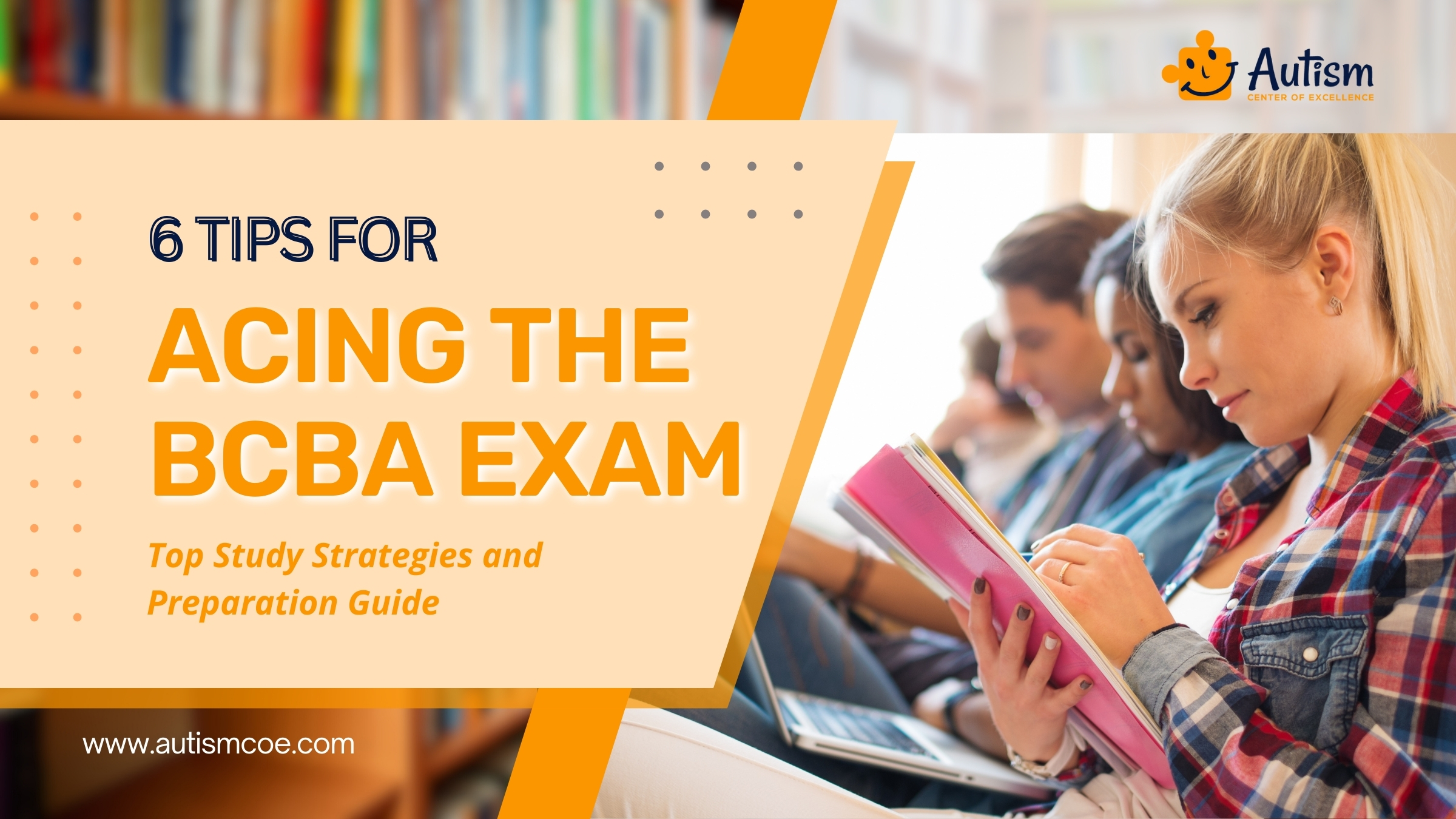Earning the BCBA (Board Certified Behavior Analyst) certification exam is a significant step in the right direction for anyone who works in the field of ABA (Applied Behavior Analysis). Not only does it make you feel proud to be certified but also provides you with a chance to take up rewarding Careers. Nonetheless, studying for the BCBA exam requires planning and can be done with difficulty without relevant preparation. Everything that you should need to know about the exam will be covered in this guide to help you succeed with ease.
What is the BCBA Exam and Why is it Important?
The BCBA exam is a professional certification examination designed to test your practical knowledge and skills in the field of applied behavior analysis. This certification approved by the Behavior Analyst Certification Board (BACB) ensures that you are competent to implement appropriate behavior change strategies in a wide range of settings.
Earning the BCBA shows that you uphold ethics and only practice what has been proven to work. It prepares you to supervise Registered Behavior Technicians (RBTs) and manage and coordinate teams to ensure clients with behavioral issues get a positive change in their lives. Succumbing this examination is a great achievement that shows that one is ready to achieve their dreams in the area of ABA.
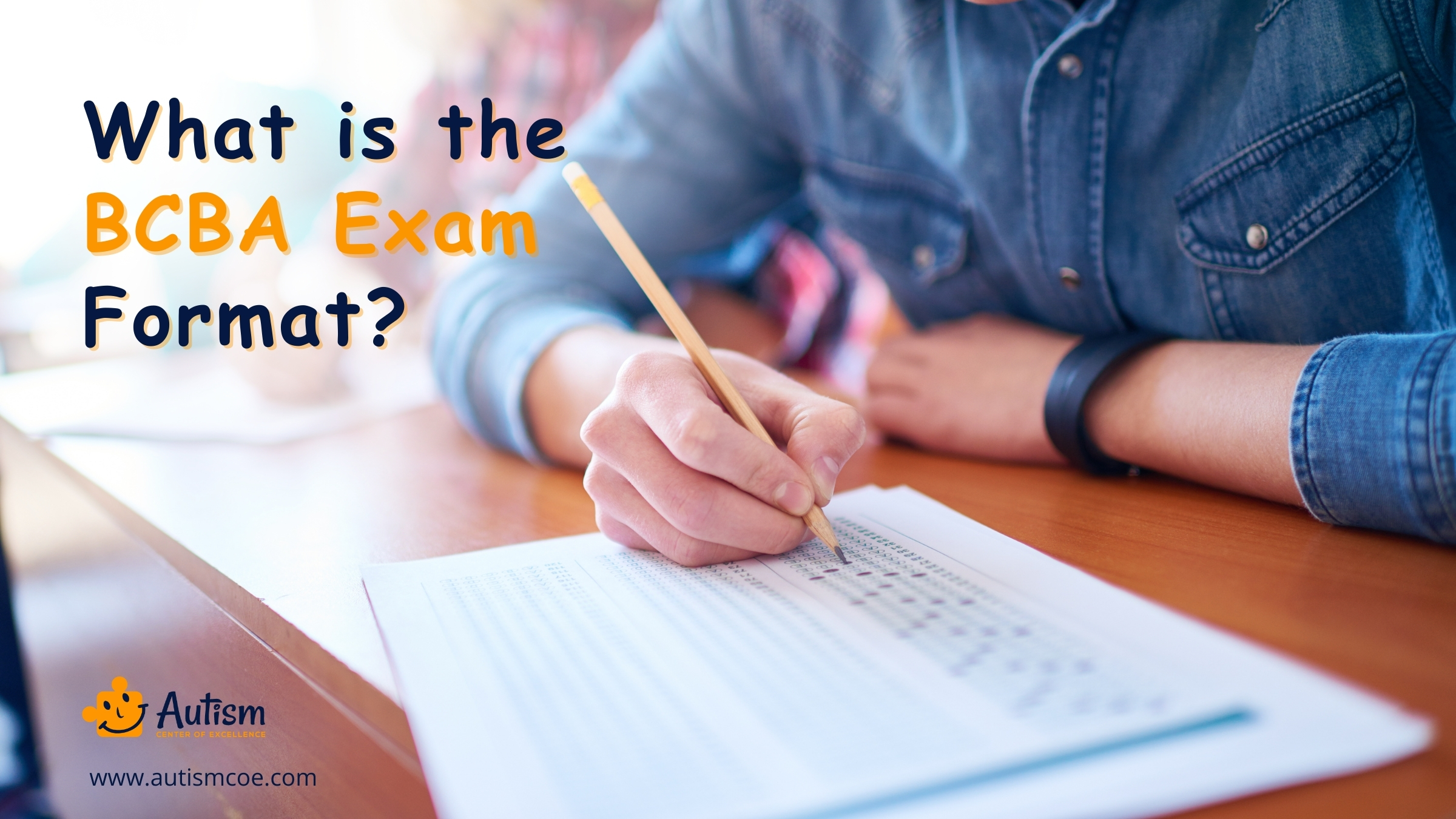
Understanding the BCBA Exam Format
Making an autism-friendly daycare facility is like constructing a unique play area to make every child comfortable and cheerful. Care is given to Children with Autism, and such children are encouraged to learn at their own pace in the facility. Here are some strategies that can help autism daycare centers become more welcoming for children:
To excel in the BCBA exam, it’s essential to familiarize yourself with its structure:
Number of Questions
The exam consists of 185 multiple-choice questions. Of these, 175 are scored and 10 are unscored pilot questions.
Time Limit
You will have four hours to complete the exam.
Content Areas
Questions cover the BACB Task List, including foundational principles, assessment, intervention, and ethical considerations.
Understanding the exam format allows you to tailor your preparation and manage time effectively on test day.

Who Can Take the BCBA Exam?
The BCBA exam is open to candidates who meet the following criteria:
Educational Requirements
A master’s degree in behavior analysis, psychology, or education from an accredited institution.
Coursework
Completion of approved ABA coursework.
Supervised Fieldwork
A minimum of 2,000 hours of supervised fieldwork or 1,500 hours of concentrated supervision.
Candidates must also adhere to the BACB’s ethical guidelines and meet any additional requirements set by their local licensing authorities.
Suggested – The Path to Becoming a BCBA: Education & Certification Requirements
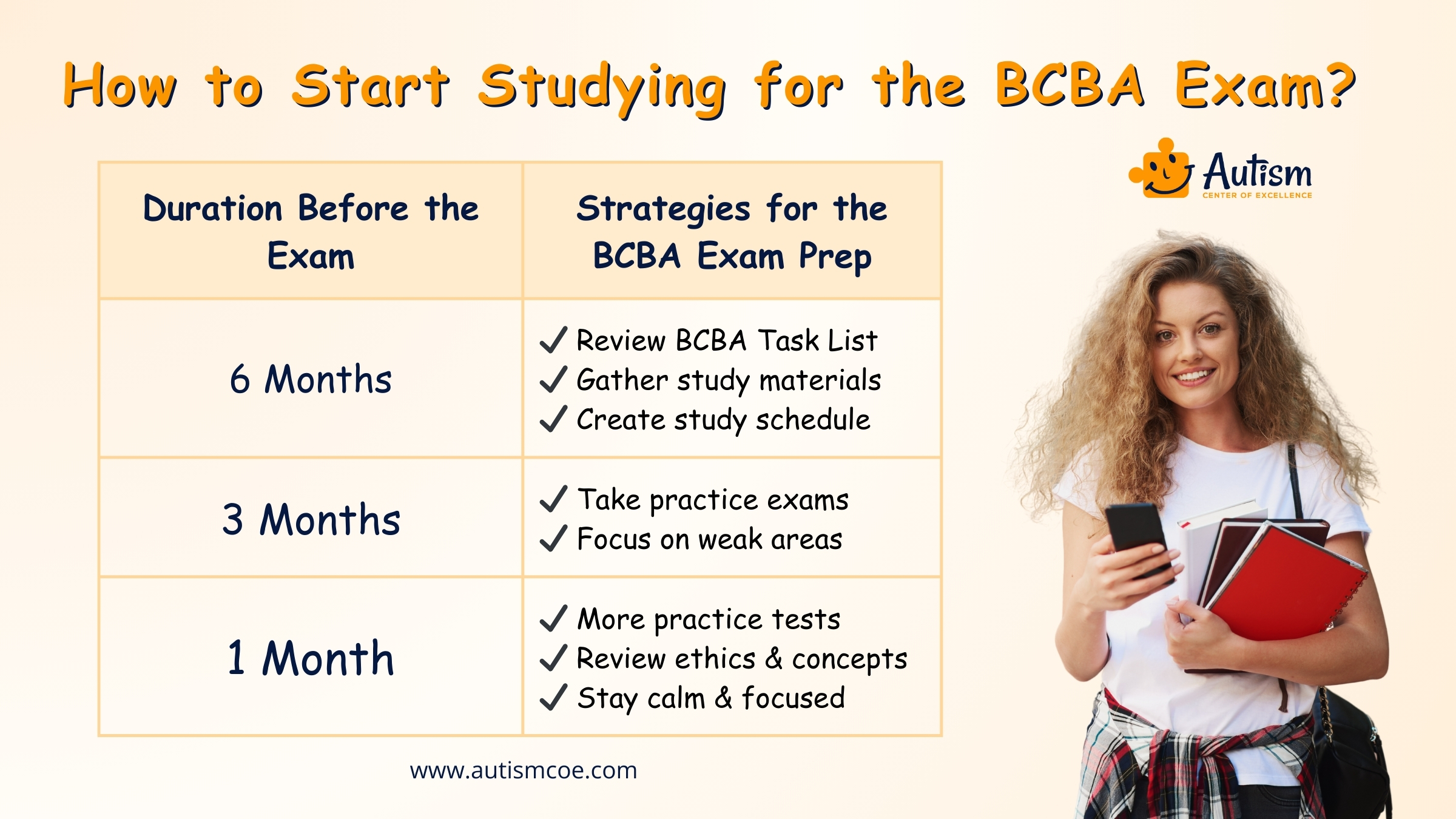
When and How to Start Studying for the BCBA Exam
The best time to start studying for the BCBA exam is right after you complete your coursework and fieldwork hours. Here’s a suggested timeline to guide your preparation:
➡️ 6 Months Before the Exam
- Begin reviewing the BCBA Task List to identify areas of strength and weakness.
- Gather study materials, including textbooks, study guides, and flashcards.
- Create a study schedule that includes daily or weekly goals.
➡️ 3 Months Before the Exam
- Start taking practice exams to gauge your progress.
- Focus on weak areas, so strengthen your understanding of these areas.
➡️ 1 Month Before the Exam
- More practice tests and timed quizzes.
- Review ethical guidelines and commonly misunderstood concepts.
- Mentally prepared, so try not to get stressed out, stay the course.
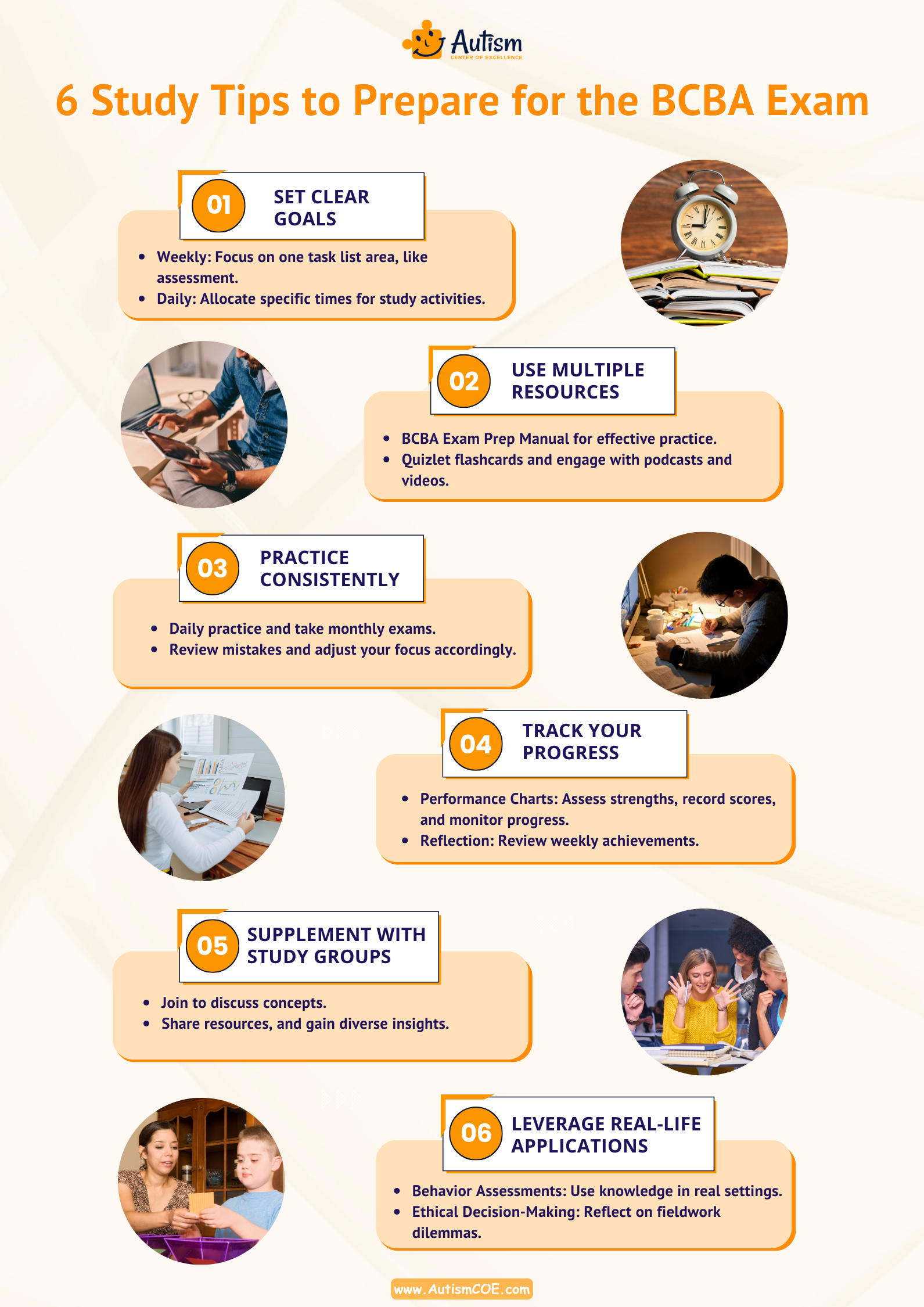
How to Prepare for the BCBA Exam: Study Plans and Resources
Preparing for the BCBA exam requires strategic planning, dedication, and the use of high-quality resources. Here is an in-depth guide to creating an effective study plan that maximizes your chances of success.
1. Set Clear Goals
Begin by establishing clear, measurable objectives for your study sessions. Breaking the BCBA Task List into manageable sections allows you to tackle one area at a time, reducing the feeling of being overwhelmed:
Weekly Goals
Assign specific topics to each week, such as focusing on one major task list area, like assessment or intervention. This approach helps you build a deep understanding of each topic.
Daily Goals
Dedicate specific time slots each day to studying, ensuring consistent progress. For instance, you might spend mornings reviewing flashcards and evenings taking practice quizzes.
By setting clear goals, you create a roadmap that keeps you accountable and ensures steady progress toward exam readiness.
2. Use Multiple Resources
Diversify your study materials to strengthen your grasp of ABA concepts from different perspectives. Each resource type offers unique benefits:
Study Guides
Invest in a reputable guide like The BCBA Exam Prep Manual or Cooper, Heron, and Heward’s Applied Behavior Analysis. These resources provide comprehensive coverage of the exam’s content.
Online Platforms
Utilize platforms like Pass the Big ABA Exam for access to mock exams, video tutorials, and breakdowns of complex concepts.
Flashcards
Create or purchase flashcards to review key terms, ethical guidelines, and foundational principles. Apps like Quizlet can help you practice on the go.
Podcasts and Videos
Incorporate ABA podcasts or YouTube videos into your routine for a more engaging way to reinforce concepts.
Using multiple resources ensures you’re exposed to varied explanations and applications of ABA principles, deepening your understanding.
3. Practice Consistently
Consistent practice is critical for retaining information and building test-taking skills. Here’s how to integrate practice into your routine:
Daily Practice Questions
Set aside 30–60 minutes each day to answer practice questions. This helps reinforce what you’ve studied and familiarizes you with the exam format.
Full-Length Mock Exams
Take at least one full-length mock exam each month leading up to your test date. This not only assesses your knowledge but also builds the stamina needed for a four-hour exam.
Error Analysis
After each practice session, review incorrect answers and understand the reasoning behind the correct choices. Use this feedback to adjust your study focus.
Practicing regularly trains your brain to retrieve information quickly and accurately under pressure.
4. Track Your Progress
Monitoring your progress helps you stay on track and make data-driven adjustments to your study plan. Here are some ways to track your preparation:
Self-Assessments
Periodically evaluate your knowledge of each BCBA Task List area. Highlight strengths and weaknesses to prioritize study efforts.
Performance Charts
Use a spreadsheet or app to log your practice test scores and track improvement over time.
Reflection Sessions
At the end of each week, review what you’ve accomplished and identify areas needing more focus.
Tracking progress gives you a sense of accomplishment and keeps you motivated throughout your preparation journey.
5. Supplement with Study Groups
Collaborating with peers can add value to your preparation. Join a BCBA study group to discuss difficult concepts, share resources, and exchange strategies. Studying in a group also provides accountability and diverse insights that can clarify challenging topics.
6. Leverage Real-Life Applications
The BCBA exam emphasizes the practical application of ABA principles. Whenever possible, integrate study concepts into your fieldwork or everyday scenarios:
Behavior Assessments
Use the skills learned in assessments to conduct Functional Behavioral Assessments (FBAs) in real-world settings.
Ethical Decision-Making
Reflect on ethical dilemmas encountered during your fieldwork and discuss how BACB guidelines would apply.
Applying concepts to real-life situations enhances understanding and retention while preparing you for scenario-based questions on the exam.
Enjoying Reading?
Join Our Weekly Newsletters!
Subscribe now to stay updated with our latest email updates.
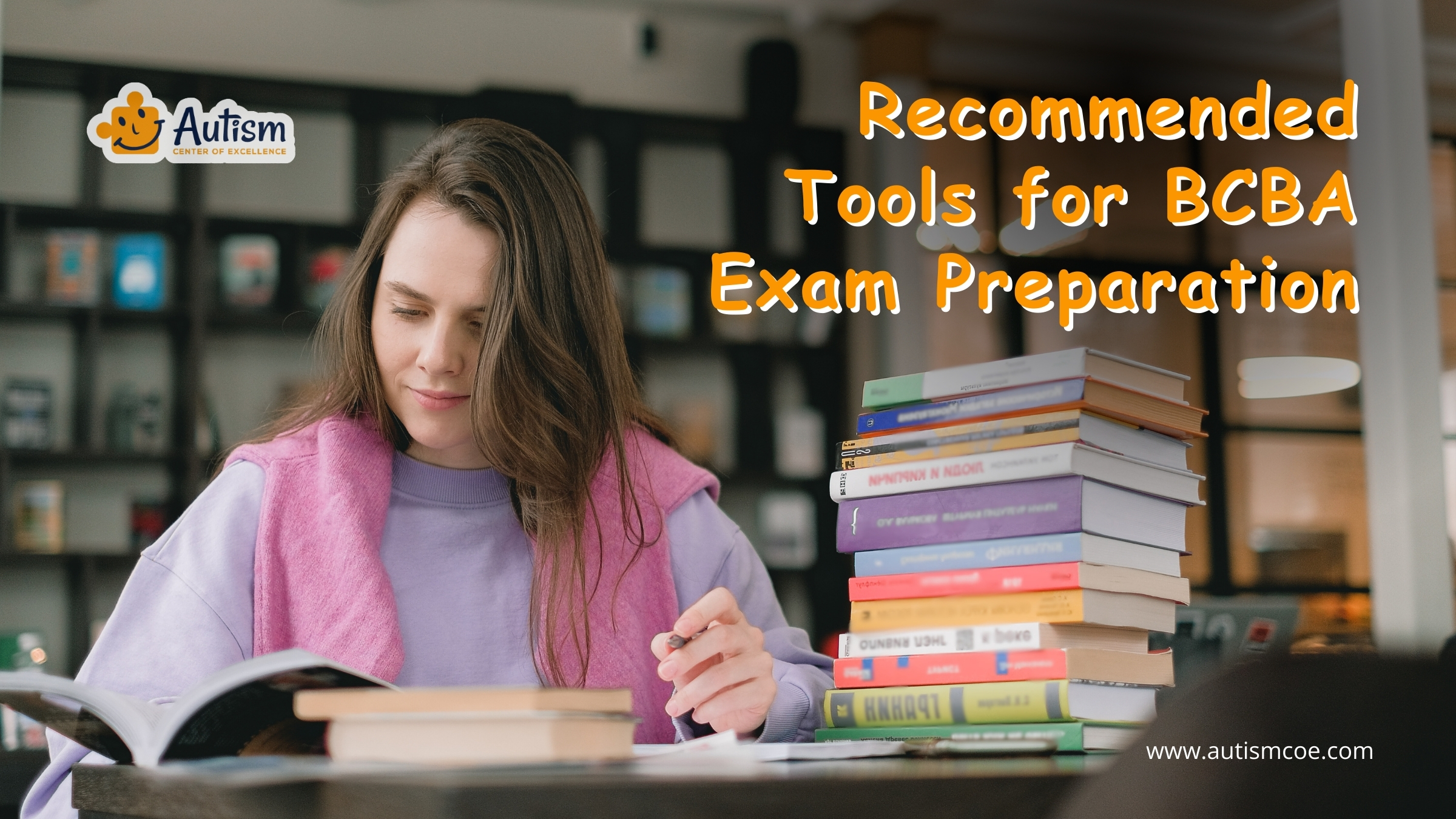
Recommended Tools for BCBA Exam Preparation
By combining structured study habits, diverse resources, and consistent practice, you can approach the BCBA exam with confidence and competence.
Books
- Cooper, Heron, and Heward’s Applied Behavior Analysis
- BCBA Exam Study Prep Crash Course by Linda Cooper
Online Platforms
- Pass the Big ABA Exam [Website]
- Study Notes ABA [YouTube channel]
Apps
- Quizlet (for flashcards)
- BCBA Exam Prep by TPN.health
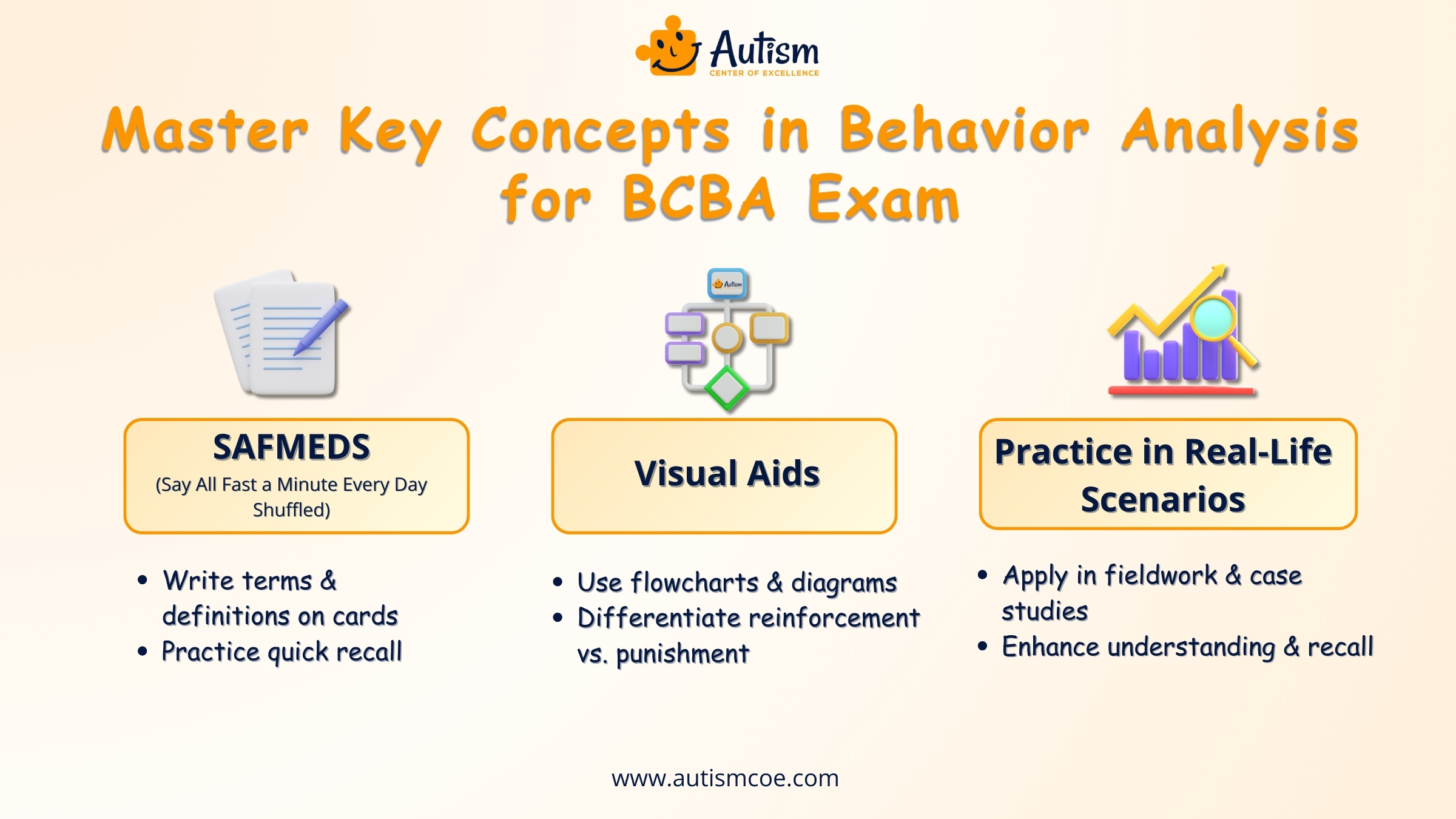
How to Master Key Concepts in Behavior Analysis
Mastering the foundational principles of behavior analysis is crucial for passing the BCBA exam. Here are some tips to help you memorize and understand these concepts:
1️⃣ SAFMEDS (Say All Fast a Minute Every Day Shuffled)
A proven technique to build fluency in critical concepts. Write terms on one side of a card and definitions or examples on the other, then practice recalling them rapidly.
2️⃣ Visual Aids
Use flowcharts, diagrams, and mnemonic devices to organize information. For example, create a chart to distinguish between reinforcement and punishment types.
3️⃣ Practice in Real-Life Scenarios
Apply key concepts during fieldwork or case studies to strengthen your understanding and recall.
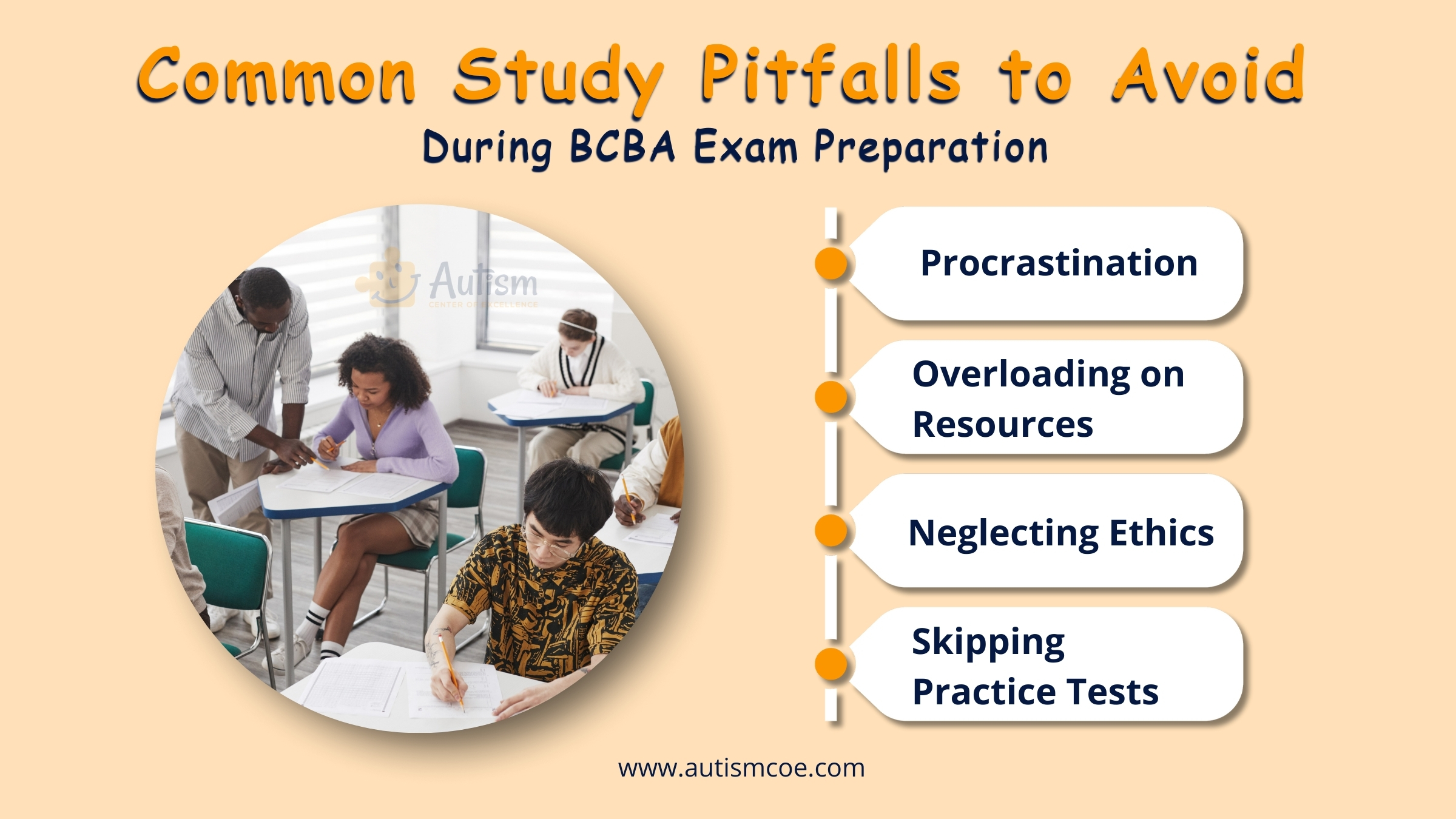
Common Study Pitfalls to Avoid
Many candidates struggle to pass the BCBA exam due to common mistakes during preparation. Here’s what to watch out for:
✅ Procrastination
Waiting too long to start studying can leave you unprepared. Stick to your schedule and start early.
✅ Overloading on Resources
Using too many study materials can be overwhelming. Focus on a few trusted sources.
✅ Neglecting Ethics
Ethical guidelines make up a significant portion of the exam. Don’t underestimate their importance.
✅ Skipping Practice Tests
Practice exams are vital for identifying gaps in knowledge and building test-taking stamina.

Tips for Managing Test Anxiety
Test anxiety is a challenge most students face in their BCBA exam. But, there are certain ways that one can easily control it by adopting strategies. Preparation entails mastery of the content and developing resistance to handling stress situations.
Before the Exam
- Maintain a regular routine to increase your confidence level so that you avoid last-minute cramming.
- Introduce some relaxation techniques like mindfulness, deep breathing, or progressive muscle relaxation.
- Simulate the actual exam conditions by practicing the timed versions of the exams to get rid of any anxiety, and get accustomed to the format and the overall examination process.
On Exam Day
- Go early in the day to calm down, re-read essential concepts, and settle into the environment.
- Maintain pacing; mark difficult questions and continue to build momentum.
- Take deep breaths for short intervals to revitalize and solve the following question with clear thinking.
- Combine preparation with anxiety-reduction techniques for a positive approach to the BCBA exam.
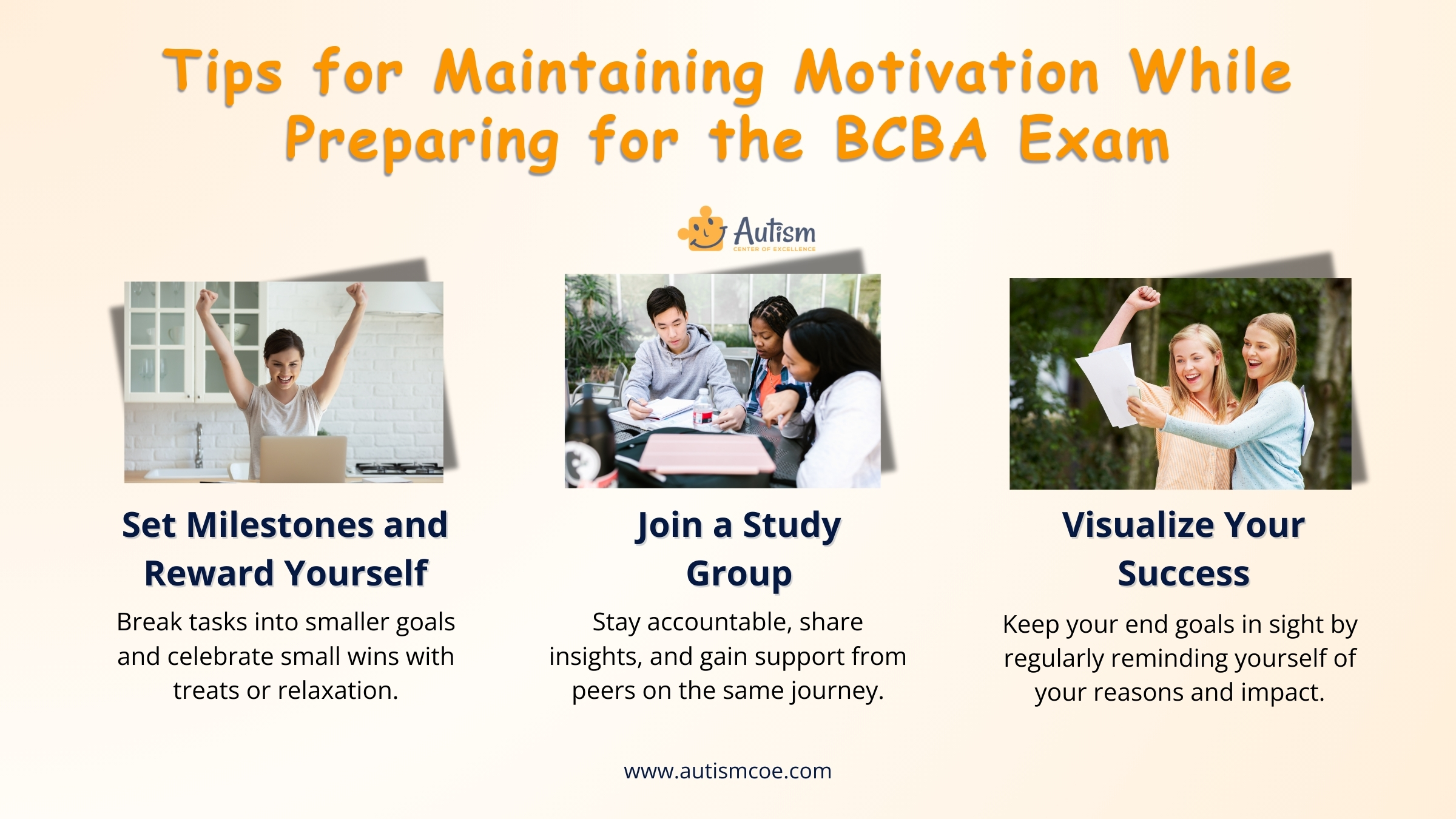
How to Stay Motivated During BCBA Exam Prep
Staying motivated can be tough, especially when one is juggling work, personal commitments, and study. However, the right strategies can help you maintain your momentum and help you reach your goals. Here are some tips that will keep you on track:
1️⃣ Set Milestones and Reward Yourself
Break your study targets into small, attainable milestones, which means you set sub-targets instead of big ones. For instance, do a chapter or pass a mock test as a mini-milestone. The award may be an ice cream, a movie, dinner outside, or time off at work.
2️⃣ Join a Study Group
Get support and encouragement from other people to have appropriate time management and a fresh look. Joining a group will also motivate you as well as give you a different view of the tough issues at hand. A study group is also a source of support from other people who understand what you are undergoing.
3️⃣ Visualize Your Success
You can make it a habit to sometimes read through the reasons that motivate you to accomplish the BCBA certification and help the field. Visualization is one good way of keeping your eye on the prize and maintaining motivation while in the process of preparation for the exam.
Frequently Asked Questions & Answer
How Many Questions Are on the BCBA Exam?
The BCBA exam contains 185 multiple-choice questions, of which 175 are scored and 10 are unscored pilot questions.
How Hard Is the BCBA Exam?
It is challenging but manageable if prepared well. The difficulty level is in applying ABA principles rather than memorization.
How Much Does the BCBA Exam Cost?
The application fee for the exam is $245, while the exam fee is $125. There are also costs associated with study materials and supervision fees.
How Many Times Can You Take the BCBA Exam?
A candidate can attempt the BCBA exam eight times within a two-year authorization period.
Conclusion
Preparation for the BCBA exam requires commitment, strategic planning, and all the right resources, but constant effort and proper study methods lead to success. Remember, passing an exam is not only about obtaining that certification but also about preparing oneself in terms of skills to truly make an impact on the lives of those with autism. At AutismCOE, we recognize that analysts must be skilled, empathetic, and committed providers, and we are committed to supporting those who seek a path as BCBAs. Whether you’re learning independently or through the assistance of a mentor, the focus and confidence needed to pursue your goals will be strengthened.
Please Note: The content of this blog is for informational purposes only and should not be considered a substitute for professional medical advice, diagnosis, or treatment. Consult a qualified healthcare professional for personalized guidance tailored to your specific situation.

Bhavika Bhasin
Bhavika Bhasin is the Research and Marketing officer at AutismCOE. She works with children and adults with ASD. Her clinical research includes evaluating various available autism screening and diagnosis methods and their efficacy. She is currently developing a novel screening exam that is indicated to be more accurate than the existing available exams. She is also writes articles papers for various publications.


